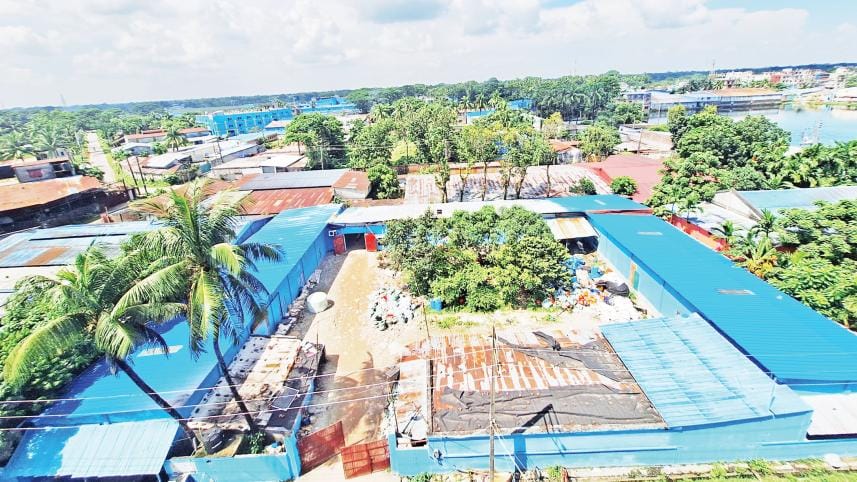Barishal BSCIC estate limping amid gas, infrastructure crises

Barishal BSCIC Industrial Estate still does not have full factory infrastructure and services more than six decades after its establishment. Despite the Padma Bridge opening several years ago, which improved links with the capital, the estate has no industrial gas supply.
Besides, regulatory issues have also weakened its business climate, leaving at least two-thirds of the plots idle.
Factories have shut down on many of the plots that were allocated, while some others have yet to start production.
A number of entrepreneurs told The Daily Star that the estate offers little support to businesses. They cited uncertainty over gas supply, an inactive owners' association following the political changeover last year and continuing red tape.
Currently, only a few factories are running at the estate under the Bangladesh Small and Cottage Industries Corporation (BSCIC). Some firms have succeeded mainly through their own efforts, but most are struggling just to stay afloat.
Some firms at the BSCIC estate have succeeded mainly through their own efforts, but most are struggling just to stay afloat
Manufacturers say removing the barriers could transform the estate into a model industrial hub for the south, creating jobs for at least 50,000 people.
The 131-acre industrial site in Ward-1 of Barishal City Corporation was established in 1960. Official records show that of 97 acres of industrial plots, 60 acres hold 115 active plots, with about 20 more producing intermittently. At least 38 plots have never gone into production.
Khan Sons Textile Ltd holds 27 acres but runs only a few plots at limited capacity.
Another 93 plots developed over 20 acres between 2017 and 2021 at a cost of Tk 71 crore remain vacant. Four factories built between 1994 and 2000 have been shut for nearly three decades.
Across the estate, stretches of empty land overgrown with grass sit alongside completed roads, drains, streetlights and boundary walls.
Abdur Rahman, manager of Bengal Biscuit, said production costs in the estate are higher than in Narayanganj due to the lack of industrial clustering. "The absence of gas supply is another major obstacle," he added.
Touhidul Islam of Nimmark Fashion Ltd said he moved part of a garment factory from Narayanganj five years ago, but had to halt production for want of gas. "I took the plot 12 years ago, but still cannot go into production," he said.
The estate hosts a handful of successful ventures, notably Fortune Shoes Factory, a 100 percent export-oriented unit. Fortune Group runs nine shoe and packaging factories here, employing more than 5,000 workers with investments exceeding Tk 500 crore.
ASM Jahangir Kabir, general manager of Fortune Group, said foreign buyers prefer visiting clusters of industries.
"We invested Tk 2,000 crore in five factories in Dhaka, employing 10,000 people. The same could have been done in Barishal if the environment were supportive," he said.
Other successful businesses in the estate include biscuit makers, bakeries, printing presses, furniture workshops, bottled water plants and aluminium crockery producers. In total, more than 7,000 people work at the estate.
Total investments in the estate crossed Tk 817 crore last year, while the government collected about Tk 1 crore in taxes.
Entrepreneurs said lease rates, previously Tk 2 lakh per acre for 99 years, are being revised upwards, discouraging new investment.
Business leaders also pointed to the divisional VAT office still being in Khulna, past licensing harassment and poor air links as barriers. Barishal Airport currently has only one flight to Dhaka a week.
Alamgir Hossain, president of the Industrial Owners' Association, acknowledged that more plots are closed than active.
He urged the authorities to convene the land allocation committee, chaired by the deputy commissioner, to decide on new allocations.
Md Nazrul Islam, deputy general manager of BSCIC Barishal, admitted vacant plots remain a major issue. "Although the environment has improved, problems like gas connections must be resolved before investors feel encouraged," he said.
Golam Rasul, BSCIC industrial estate officer in Barishal, said the authority is working to create an industry-friendly environment and holds regular meetings with entrepreneurs.
"First, gas has to come to Barishal. Once that happens, BSCIC will take steps to ensure supply to the industrial estate," he said.
At a press conference at the Barishal Circuit House on Saturday, Shipping, Labour and Employment Adviser Brig Gen (retd) M Sakhawat Hussain said that they were making serious efforts so that gas could come from Bhola to Barishal.
"Hopefully, we will be able to make some progress on this matter," he added.





 For all latest news, follow The Daily Star's Google News channel.
For all latest news, follow The Daily Star's Google News channel.
Comments